Twitter Demands Meta Cease and Desist New Threads App
Twitter served Meta a cease and desist letter over Threads, Meta’s newly launched app. Twitter accuses Meta of misappropriating Twitter’s trade secrets and hiring former Twitter employees who retained proprietary information. The letter alleges that Meta deliberately assigned former Twitter employees to Threads so that they could apply Twitter’s trade secrets in building Thread, which they allege is a “copycat” application.
After Elon Musk purchased Twitter, the company significantly cut costs. Twitter laid off about 75% of its 7,500 person workforce. Musk purchased Twitter for $44 billion in October 2022 and has been embroiled in controversy ever since.
Threads has proven to be a major competitor to Twitter since it launched. Threads gathered over 30 million users in its first morning alone. Social media stars like Shakira have signed up. Meta denies that any former Twitter employees have worked on Threads, which is built off Meta’s existing Instagram app.
 The Non-Compete Clauses Are Likely Unenforceable
The Non-Compete Clauses Are Likely Unenforceable
Twitter may not prevail over Meta under California law, where both companies are currently headquartered. Although Meta denies that any former Twitter employees have worked on Threads, it may not matter even if such employees did work on the new app. Most employee non-compete clauses are unenforceable in California.
Even if such non-compete clauses were not void in California, Musk has arguably waived his right to enforce such agreements. Musk himself put out a sarcastic tweet after news of the layoffs came out, stating: “I would like to apologize for firing these geniuses. Their immense talent will no doubt be of great use elsewhere.” This tweet arguably releases any former employees from a non-compete clause. Additionally, Twitter is embroiled in lawsuits by former employees for failure to pay the severance packages they were owed. If Twitter refuses to pay the employees their compensation under the terms of their contract, then the contract may be considered void.
Twitter’s Trade Secrets
Twitter also alleges that Threads was built using Twitter’s trade secrets and that Meta hired former employees in order to obtain said trade secrets. A trade secret is valuable information which provides a business with a competitive edge over other businesses. Trade secrets may include formulas, programs, algorithms, computer codes, methods, or processes. If Threads was built using computer codes or algorithms from Twitter, then this would be an infringement of Twitter’s trade secrets.
However, Twitter would also have a difficult time proving that Threads was derived from the same codes or algorithms that built Twitter. Threads and Twitter are both short message social media applications. Short message applications are not inherently complex and are actually easy to startup. Indeed, other short message app competitors like Truth Social can be run by non-engineers like Devin Nunes and still function to a certain degree. Threads was built using existing Instagram infrastructure and Facebook has similar message board functions.
In order for Twitter to prevail in any trade secrets lawsuit, Twitter will have to point to exactly what is unique about Twitter and whether those features were present in Threads when the latter was launched. Twitter would also have to prove that those unique features could not have been replicated but for access to Twitter’s trade secrets. However, the simplicity that made Twitter attractive to users in the first place means that those same features may be easy to independently duplicate even without access to Twitter intellectual property.
Do I Need a Lawyer for Help with My Non-Compete Agreement?
If you are a business owner in a state where non-compete clauses are enforceable, you may be able to draft a non-compete agreement for your employees on your own. If you’re an employee you may be able to negotiate or challenge a non-compete agreement without a lawyer. You should consult with an employment lawyer who can help you understand the agreement and/or represent you in court.


Comments